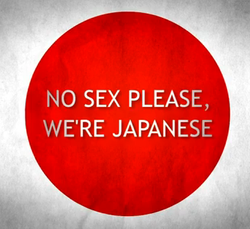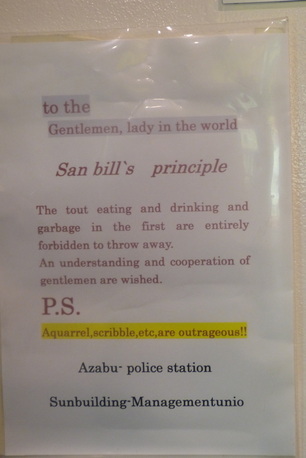Last term my contribution to the Blake blog was written while I was in Japan. At that point I felt my geography perfectly justified playing the ‘I learn stuff about Asia’ card, and so I waxed lyrical about the glories of misguided English t-shirt slogans (“The Ging is liable!”). But settled back down in England as I have been for a while now, I thought maybe I should find something entirely different to talk about, to maybe create the illusion that I’m a more rounded individual than that. Then Freshers’ week hit. I’ve had so many raised eyebrows at the phrase “No, I’m not in your year – I’m a fourth year, I was abroad last year, that’s why you’ve never seen me before (be my friend??)” that I’ve given up. Provider of niche titbits from the Far East I shall remain…
 If it rhymes, no need to think too hard about it
If it rhymes, no need to think too hard about it There is actually a lot to say that isn’t so niche of late. This week, articles and BBC documentaries about declining birth rates and men who don’t want relationships (the phenomenon applies to women too, but the men are apparently more intriguing) are doing the rounds in the British media. With my academic hat on, these irritate me intensely, specifically their inevitable and wholly dissatisfactory conclusion that ‘Japan is so unique and unknowable and different – just look at all this weird stuff we’ve filmed!’ Regular people who aren’t interested in relationships? We don't buy that, so let's go looking for some culturally-rooted theory that ‘explains’ why everyone is so different on this side of the globe. Leave aside the fact that it is highly condescending to do this; leave aside the unhelpful tendency of the Japanese themselves to go along with it and insist that they are indeed ‘unique’; it is just frustrating, because a tiny bit of background knowledge about any given part of ‘Japanese weirdness’ more often than not makes Japanese behaviour a whole lot more familiar.

Take two snapshots of Japanese life that I would pass through on a near-daily basis living in Kyoto – both are pretty unfamiliar by Western standards, but by no means ‘unique’ or ‘unexplainable’. First, if I ever cycled along the river that ran through the centre of town, particularly in summer the banks would be crowded with people engaged in all manner of hobbies and pastimes – from groups practising team sports to individuals practising the trombone, from yoga instructors bellowing at their students to amateur film-makers choreographing dance sequences on mobile phones. The figure who surprised me most during my year was the middle-aged man orating poetry at the top of his voice, entirely and delightfully oblivious to the world around him. Second, delve into the even vaguely built-up areas of the city and you can’t find a street without karaoke, games arcades and pachinko parlours. You may think you know what karaoke is like, but probably haven’t ever encountered, much less opted for, the 24-hour deals where serve-yourself ice cream and caffeine drinks are provided to fuel you as you belt out the hits all through the night in your sound-proofed escape pod from the real world. You may think you know what a games arcade is like, but probably haven’t trawled through an 8-storey building packed with chain-smoking off-duty businessmen glued to Tekken or Dance Revolution. Pachinko you may not have heard of – its essentially pinball, but with no paddle thingies (technical term) to hit the balls with, just a continuous, hypnotic cycle of blind luck (and, increasingly, little animated videos if you win). There are one or two terrifying stories of semi-addicted parents neglecting their children while they are glued to the machines, the bright lights and loud music stopping time.
The boring fact behind both of these faces of Kyoto life? Japan is a mountainous, earthquake-prone country, with sufficiently little flat land that cities are squeezed in wherever they fit, buildings packed together, traditionally not especially sound-proof as has been the case since the days when re-buildable paper walls were the only defence against earthquakes. Making noise is simply not practical. I don’t deny that there is also a cultural tendency towards politeness, formality and reservation, but it is hardly unique or incomprehensible that since you need to keep quiet indoors, you had better take your trombone, your dance routine or your poetry outdoors. The marathon noise-fests at karaoke, games arcades and pachinko are similarly a recognisably human form of escapism – escape into noise, and away from the need to be courteous to your neighbours.
The Western stereotype of severe, conformist, polite little Japanese people is over a century old, and clinging to it is just as out-of-date, but it is the stereotype to which we are mentally pandering whenever these social phenomena come along and make us go ‘Really? The Japanese are like that?’ I was asked to do a piece for CamFM last year about education in Japan, and I was surprised to discover that there is a vaguely serious truancy problem at Japanese universities, something that does not tally with either the inadequate stereotype of the highly motivated Asian student perpetually in the library (to which I try hard not to subscribe) or with the more realistic fact that Japanese school kids are pushed through an extremely challenging and competitive university entrance system, complete with cram-schools and extra tuition as fairly standard practise (from which I benefitted hugely, as I spent my year teaching kids as young as 4). Such serious students suddenly playing truant? Actually, given a first taste of freedom at university, I think many of us would follow suit.
 The screen reads 'Love Plus'; this does undermine my point a tad!
The screen reads 'Love Plus'; this does undermine my point a tad! And what, to return to the issue of the week, about this surely-bizarre, surely-unique, surely-inexplicable trend of ‘perfectly normal’ Japanese men who in spite of their being ‘perfectly normal’ don’t seem to want relationships? This one is less intuitive, I’ll admit, but it is essentially one aspect of a broader brand of counter-culture. Japan is perhaps not the most enlightened of countries when it comes to gender equality, and interestingly in this case young men are the ones trying to throw off the shackles of social expectations – be the breadwinner, work hard, climb the corporate ladder, be the head of a household – and live their lives with a bit more individual freedom. Put yourself in the position of someone for whom the expectation is that the relationship is less about the thing itself and more about the responsibility to form a family (maybe not so familiar in the UK anymore, but by no means unique worldwide) and suddenly it doesn’t sound so crazy that a subsection (that's the other thing – these stories get dressed up as though everyone is like this, which is simply not true, and I imagine film makers search hard before they find the extreme examples of people like the man in the BBC documentary's introduction who struggle to pick between their wives and their Nintendo 'girlfriends' ) of Japanese men would reject the whole thing.
We should use our brains a bit more before de-humanising an entire nation by letting our appetite for media coverage of 'weird' stuff get in the way and labelling it 'inexplicable'. Different, for sure, weird and wonderful, perhaps, but Japanese people are by no means beyond anyone’s understanding.
On the ‘weird and wonderful’ note, an update on my previous topic – entirely unrelated, but I simply have to share with the Blake blog readership this sign I saw on a toilet door in Osaka, two weeks before I came home:
On the ‘weird and wonderful’ note, an update on my previous topic – entirely unrelated, but I simply have to share with the Blake blog readership this sign I saw on a toilet door in Osaka, two weeks before I came home:
Okay…some things are a little beyond understanding!
Sam Glynn
Sam Glynn



